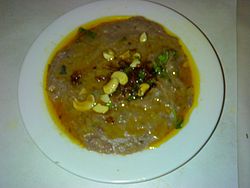Hyderabadi haleem: Difference between revisions
m →Preparation: grammar |
Mrpontiac1 (talk | contribs) Hyderabad is in India |
||
| Line 56: | Line 56: | ||
[[Category:Hyderabadi cuisine]] |
[[Category:Hyderabadi cuisine]] |
||
[[Category:Indian fast food]] |
[[Category:Indian fast food]] |
||
[[Category:Pakistani cuisine]] |
|||
Revision as of 17:55, 10 September 2009
 Hyderabadi Haleem | |
| Place of origin | India |
|---|---|
| Region or state | Hyderabad |
| Main ingredients | Pounded Wheat, Lentils & Mutton |
Hyderabadi haleem (Urdu: حيدر آبادی حلیم) is a type of meat stew of Hyderabad.[1] It is a popular dish during the Muslim month of Ramadan.[2] The cooking of haleem in Hyderabad is mastered to an art form, like the popular Hyderabadi biryani.
It is a type of stew made from pounded wheat and mutton (or beef) made into a thick paste. It is the mainstay during the Holy month of Ramadan. It is a tradition to break the daily fast (roza) at Iftar with a plateful of haleem. In Hyderabad, haleem is the traditional starter at Muslim weddings, celebrations and other special occasions.
Ingredients
The ingredients include mutton, cracked wheat, lentils, ginger & garlic paste, turmeric and spices. It is served hot topped with ghee based gravy and lime pieces, coriander and fried onions as garnish.
The chicken haleem is less popular, but is cheaper than the lamb version.
A vegetarian derivative of haleem, in which dry fruits and vegetables are substituted for meat, and is available at some eateries in Hyderabad.
Preparation
Haleem is cooked on a low flame for over 10 hours in the bhatti (a cauldron covered with brick & mud kiln) and two men, usually, mix it thoroughly with large wooden sticks through out its preparation, until it gets to a sticky-smooth consistency, similar to mashed mince.
Meethi (sweet) and khari (salted) haleem variants are served for breakfast at Arab homes in the Barkas area of Hyderabad. The salted variety is popularly seen during the months of Moharram and Ramadan. The high-calorie haleem is an ideal food to break the Ramadan fast.
History
Main Article: Haleem
This traditional wheat porridge has its roots in Arabia, similar to harees. But this derivative of haleem is different from the rest, with a nice smooth paste of all ingredients well mixed.
See also

Further reading
- A Princely Legacy, Hyderabadi Cuisine By Pratibha Karan ISBN 8172233183, ISBN 978-8172233181[1]
- Elegant East Indian and Hyderabadi Cuisine By Asema Moosavi, Moosavi, Asema ISBN 0969952309
- The Essential Andhra Cookbook with Hyderabadi & Telengna Specialities by Bilkees I Latif
